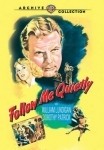| Reviews & Columns |
|
Reviews DVD TV on DVD Blu-ray 4K UHD International DVDs In Theaters Reviews by Studio Video Games Features Collector Series DVDs Easter Egg Database Interviews DVD Talk Radio Feature Articles Columns Anime Talk DVD Savant Horror DVDs The M.O.D. Squad Art House HD Talk Silent DVD
|
DVD Talk Forum |
|
|
| Resources |
|
DVD Price Search Customer Service #'s RCE Info Links |
|
Columns
|
|
|
Follow Me Quietly (Warner Archive)
Strange, unsettling film noir mystery, with a disturbing subtext. Warner Bros.' essential Archive Collection of M.O.D. (manufactured on demand) library titles has released Follow Me Quietly, the 1949 thriller from RKO starring William Lundigan, Dorothy Patrick, and Jeff Corey. Directed by Richard Fleischer, with a screenplay based on a story co-written by another noir alumni, Anthony Mann Follow Me Quietly may come in at an impossibly short 59 minutes...but it packs an unnerving wallop. An original trailer is included as a bonus―nice.
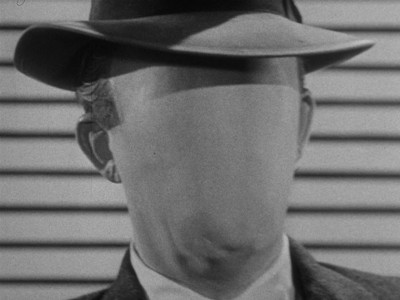
A homicidal maniac is loose on the streets of L.A., and grimly-determined, increasingly frustrated cop Lieutenant Harry Grant (William Lundigan) is obsessed with bringing him to justice. Calling himself "The Judge," this serial killer has struck seven times, always at night, always in the rain, with strangulation his preferred method of destruction. "The Judge" taunts the police to find him with notes left behind asserting his divine ordination to wipe out evil, as well as incriminating personal clues, but after months of investigation, Grant and his partner Sergeant Art Collins (Jeff Corey) are just as stymied as they were when the first victim was found. In desperation, Grant re-gathers all the clues left behind by "The Judge"―hat, gloves, shoe, gray hairs, letters―and commissions first a sketch, and then a life-sized dummy based on that sketch, to create a faceless facsimile of the suspect in the hopes that such a manifestation will jar the memories of potential witnesses, while giving police officers a visual to focus on in their investigations. What Grant doesn't count on is falling for go-getting true-crime mag writer Ann Gorman (Dorothy Patrick), who becomes a critical part of his investigating team.
MAJOR PLOT SPOILERS WARNING
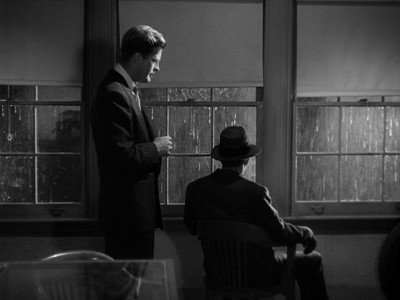
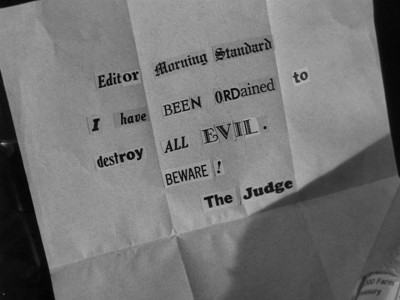
One of my favorite RKO noirs because it's so speedy and strange, balancing a semi-documentary feel with jarring inserts of waking nightmare surrealism, Follow Me Quietly is a hard little gem of a thriller that makes every frame count in its scant 59-minute run time. Working from a script by veteran writer Lillie Hayward (Blood on the Moon, The Shaggy Dog), based on a story by Francis Rosenwald and Anthony Mann (He Walked By Night, Raw Deal, Bend of the River), director Richard Fleischer continued to hone his considerable noir sensibilities here (as he had shown in Bodyguard and The Clay Pigeon, and which he would later expand in Armored Car Robbery and his noir masterpiece, The Narrow Margin), showing an admirable ability to marry an informative visual schematic to a thematically difficult subtext. Fleischer, whose current critical reputation is weighted too heavily (in the negative) in consideration of his later big-screen, big color studio efforts, pulls off a neat trick here: a psychologically suggestive noir that masquerades as a straight-ahead thriller not too particularly concerned with its killer's motives.
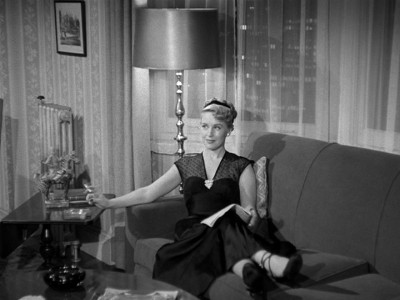
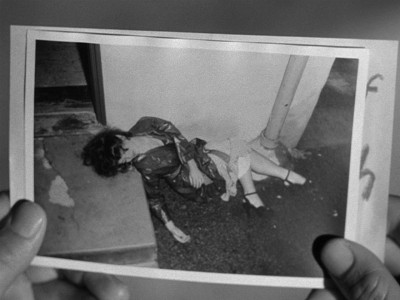
Critics writing about Follow Me Quietly often focus on its semi-documentary feel, with real location montages of the police in action looking for "The Judge," while Grant and his men mock up the dummy and beat the pavement in a laborious effort to trap the killer. While those elements are certainly compelling in Follow Me Quietly, they're not as prominent or as finely executed as in Mann's He Walked By Night. I find the subtext of linking the cop Grant with the killer "Judge" far more intriguing here, introducing visual elements that are necessarily expressionistic rather than documentary-realistic. Right from the beginning of the film, the director and screenwriter know exactly what they want to do with the audience: convince them on a subliminal level that Grant and "The Judge" are two peas in a pod. You might even go so far as to suggest they wanted us to think Grant was the killer, according to how some critical scenes played out (how cool would it have been for "The Judge" to be revealed as Grant in the final fight, with Charlie Ray innocently paying for Grant's crimes???).
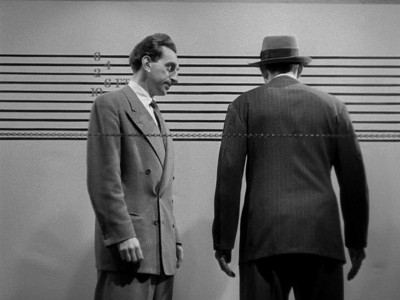
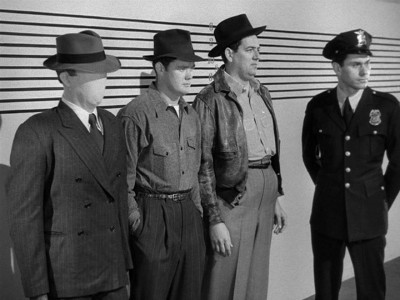
In the film's opening sequence, Four Star Crime writer Ann talks to Sgt. Collins about Grant at The Tavern bar. When Collins tells Ann that for Grant, this case is personal, she agrees it is for her, too―to which Collins rather ominously answers that it's far more than just "personal" for Grant. Only later, after the various clues pile up does that statement sound rather foreboding; why else is Grant so obsessed with this particular case...unless it strikes psychologically a little too close to home? When Grant is pressed as to why he's so vehemently opposed to the kind of true-crime magazine Ann writers for, he suggests they're perfect vehicles for influencing people to commit crimes; is his disdain and anger a result of his own fear at such a thought? Twice in the film, Collins warns Grant that he might be mentally going over the deep-end, becoming too involved with the discovery of "The Judge," and indeed, director Fleischer shows Grant increasingly agitated over his impotence in solving the crime, including a beautifully-shot "reveal" that has Grant raging about not being able to see "The Judge's" face...just as Fleischer has Lundigan lift his face in full close-up and stare right at us. Is this the face Grant wants to see, but refuses to do so?
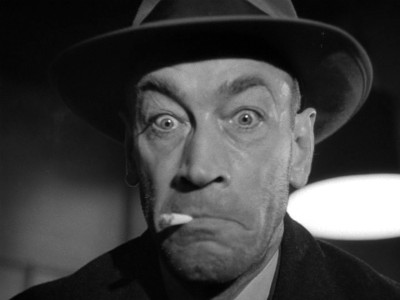
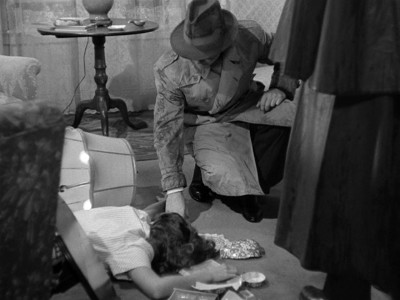
Don't forget that Fleischer has Grant "become" "The Judge" several times in the film. During the genuinely spooky sequence in the film when the dummy "Judge" is presented at a police line-up for reporters and cops (cinematographer Robert De Grasse's frames are remarkably creepy here), Grant does a more-than-convincing job of voicing "The Judge's" twisted credo over an echoy P.A. system. Later, Grant will assume the mannerisms of "The Judge" at a diner to jar the memory of a waitress who proves instrumental in fingering the real (?) "Judge." Later in the film, when the rain begins to fall outside Grant's office, Fleischer goes to close-up on Lundigan again, as he looks directly at us (again), before nervously starting to fidget. He goes and talks to the seated dummy (who's looking out the window), pouring out his frustrations, before he suggests meeting up with the killer on a "blind date" (a weird psycho-sexual comment loaded with double meanings) before Collins interrupts them, again warning Grant about his sanity. Grant replies "I'm too restless; the rain makes me nervous"―the exact words "The Judge" used in one of his letters, which is noted by Collins who replies, "You're getting more like 'The Judge' every day." (Fleischer tops this scene by having the dummy "come to life"―it really was "The Judge" sitting in Grant's office; a terrifically unsettling moment in the movie).
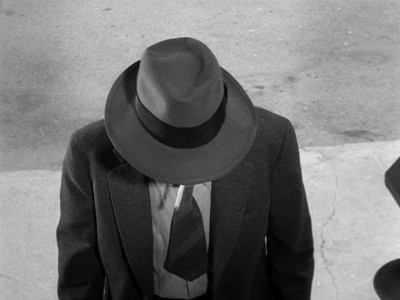
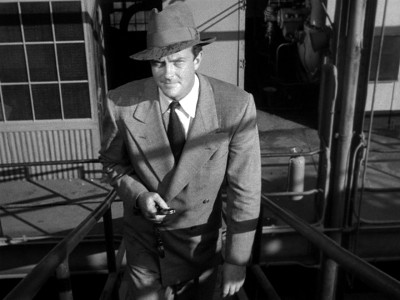
To drive his and Hayward's point home about Grant's doppelganger identification with "The Judge," Fleischer shoots long shots of Grant and "The Judge" fighting over a cat walk so that both are indistinguishable from each other during the exciting finale at the industrial pumping station. With Grant mirroring the reveal of his face just as "The Judge" did on the steps of his apartment, Fleischer shows the horror on "The Judge's" face when he sees his spiritual double. And one doesn't have to be a student of Freud to see the significance of the final desperate struggle between the two, high over the station on a cat walk, with Grant holding onto "The Judge's" handcuff for dear life, as they both try to rid themselves of each other before they splatter to the ground. There's no need to understand or have stated the motives of "The Judge's" serial crimes: one only has to look at the illogical, deeply disturbed obsessiveness of his spiritual double, Grant the cop, to see why he kills.
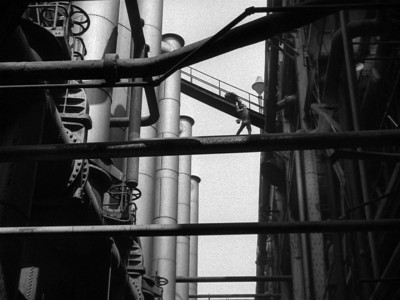
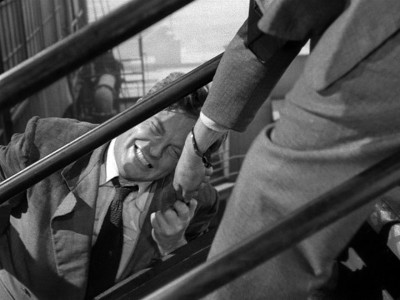
The DVD:
The Video:
The full-screen, 1.33:1 black and white transfer for Follow Me Quietly looks quite good, with solid blacks, a sensitive gray scale, a sharpish picture and only minor image imperfections such as scratches and dirt. Grain is present, as expected, but not distracting.
The Audio:
The Dolby Digital English mono audio track was re-recorded at a decent level, with all dialogue heard cleanly, and hiss kept at a minimum. No subtitles or close-captions are available.
The Extras:
I've noticed more and more Archive Collection titles are coming with their original trailers―nice move. This one sells the movie very well.
Final Thoughts:
Don't let Follow Me Quietly's short length fool you: this dreamy/nightmarish noir from director Richard Fleischer is a brilliant little thriller that's all the more remarkable for its economy of execution and its unsettling subtext. An absolute must for fans of the genre, I'm highly, highly recommending Warner's Archive Collection disc of Follow Me Quietly.
Paul Mavis is an internationally published film and television historian, a member of the Online Film Critics Society, and the author of The Espionage Filmography.


|
| Popular Reviews |
| Sponsored Links |
|
|
| Sponsored Links |
|
|
| Release List | Reviews | Shop | Newsletter | Forum | DVD Giveaways | Blu-Ray | Advertise |
|
Copyright 2024 DVDTalk.com All Rights Reserved. Legal Info, Privacy Policy, Terms of Use,
Manage Preferences,
Your Privacy Choices | |||||||









